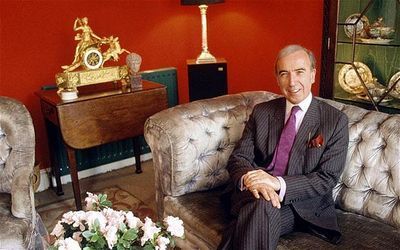Norman the Magnificent
BY PETER STOTHARD
 My friend David Hare, the aesthete and distinguished designer of interiors who lives in France, has just emailed me about the death of Norman St John-Stevas.
My friend David Hare, the aesthete and distinguished designer of interiors who lives in France, has just emailed me about the death of Norman St John-Stevas.
We were last month planning to arrange dinner with the unique Lord St John — but were now forestalled by a death of which, I must admit, I had been unaware till David told me of it.
Perhaps I need to keep up with the obits more. The TLS does not require constant vigilance to rumour or reports or what we used to call 'the wires' but which now have other names.
Nor does the Man Booker Prize, whose chairmanly duties are currently quite demanding, nor the Classical Association which demands of its president a little too.
But none of that is quite an excuse.
I see that there are already fine tributes this morning to Norman who, amongst his other grander glories, chaired the Booker Prize in 1985 and had given me a liitle good advice which, like all Booker communications, must remain confidential even in death.
I told him that I did not think these days too much about the Thatcher era, the time when we first met. Since I have watched barely more than a dozen films in all my life (he was a bit shocked by that) I am unlikely to see Meryl Streep in the role.
So deaths of political friends (how few of them there really are) are an excuse for a little nostalgia, especially if their news arrives a little late from France.
Norman was magnificent in many ways as a subversive Cabinet minister at the beginning of the Thatcher government. But he was an unusually magnificent source in my earliest reporting days.
As a boy from Chelmsford I had once been his constituent. But he was not a great lover of the place and thus, while we shared that view, it was only a small help. His words on the County Town of Essex were merely wittier than mine.
Nor was I on his side of the big political arguments — or even particularly against him — at a time of the intensest divisions. He thought my position in this regard to be ill-starred but entirely reasonable. Anyway, I was a very junior political journalist for The Sunday Times at the time and it hardly mattered what I thought.
I did, however, always listen carefully to what he said. My words with him were my first, and never equalled, experience of being told the opposite of what those words, if seen in print or over heard, would seem to mean.
Norman was a master craftsman of being a source. I suppose that any examples of that should remain Man-Booker-confidential still.
When I later became editor of The Times he both congratulated and claimed a little credit for my advance. He claimed a little payback from time to time when there might be stories about art or architecture that might otherwise have been neglected.I was happy to oblige.
I most of all this morning wish that David Hare and I had had that supper.
Peter Stothard's Blog
- Peter Stothard's profile
- 30 followers



